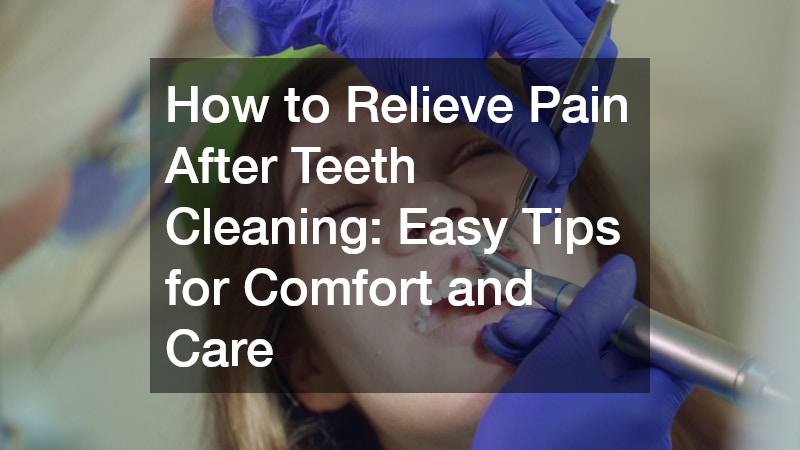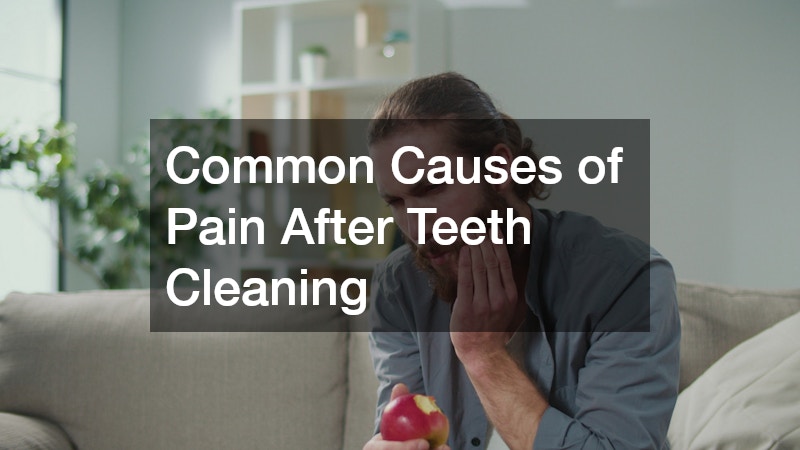
Dental cleanings are essential for maintaining good oral health, but sometimes, your teeth might feel sore or sensitive afterward. If your teeth hurt after cleaning, you’re not alone. This article explains why this happens and shares easy ways to relieve pain after teeth cleaning so you can feel comfortable and protect your smile.
Common Causes of Pain After Teeth Cleaning
Several reasons explain why your teeth might hurt after cleaning:
- Gum sensitivity and inflammation: Removing tartar can irritate gums, causing soreness.
- Exposed tooth roots: Cleaning removes protective tartar, exposing sensitive tooth surfaces.
- Pressure from dental tools: Scaling and scraping may cause mild trauma.
- Existing dental issues: Cavities, cracked teeth, or receding gums can feel more sensitive after cleaning.
How to Relieve Pain After Teeth Cleaning: Practical Tips
If your teeth hurt after cleaning, it can be uncomfortable and frustrating. Fortunately, there are several simple and effective ways to ease this pain and help your mouth heal faster. Here are some practical tips you can try at home to relieve discomfort and protect your oral health after a dental cleaning.
1. Rinse With Warm Salt Water
One of the easiest and most effective remedies for soothing irritated gums after a cleaning is rinsing with warm salt water. To make this rinse:
- Mix about 1/2 teaspoon of salt into a glass of warm water.
- Swish the solution gently around your mouth for 30 seconds to 1 minute.
- Spit it out and repeat 2–3 times a day, especially after meals.
Salt water helps reduce inflammation and promotes healing by drawing out bacteria from the gums. It can also soothe soreness and decrease any swelling, providing quick relief. Be sure not to swallow the saltwater rinse.
2. Use a Soft-Bristled Toothbrush
After a cleaning, your gums and teeth may feel tender and sensitive. Using a soft-bristled toothbrush helps prevent further irritation and protects sensitive areas:
- Switch to a soft or extra-soft toothbrush for a few days after your cleaning.
- Brush gently in small circular motions instead of scrubbing hard.
- Choose a toothpaste made for sensitive teeth, which often contains ingredients to block pain signals from sensitive nerves.
Taking these steps helps keep your teeth clean without aggravating soreness or inflamed gums, speeding up recovery.
3. Take Over-the-Counter Pain Relievers
If your pain is more noticeable or uncomfortable, over-the-counter pain medication can be very helpful:
- Ibuprofen (Advil, Motrin) not only reduces pain but also decreases inflammation.
- Acetaminophen (Tylenol) can relieve pain but does not reduce swelling.
- Always follow the dosage instructions on the packaging.
- If your pain persists beyond a few days or gets worse, contact your dentist.
These medications can provide temporary relief and make eating and speaking easier while your mouth heals.
4. Avoid Hot, Cold, or Acidic Foods and Drinks
Certain foods and drinks can worsen sensitivity or irritate your gums after a cleaning:
- Avoid very hot or cold foods and beverages, as they may trigger sharp pain.
- Steer clear of acidic foods like citrus fruits, tomatoes, and vinegar-based dressings, which can sting sensitive gums.
- Skip sugary sodas, coffee, and spicy foods for a few days to reduce irritation.
- Instead, choose mild, soft foods and drink room-temperature water or herbal tea.
This approach helps your mouth recover faster and prevents unnecessary discomfort.
5. Apply a Cold Compress
Cold compresses can help reduce swelling and numb the painful areas outside your mouth:
- Wrap a few ice cubes in a clean cloth or use a cold pack.
- Apply it gently to the outside of your cheek where your gums feel sore.
- Keep it there for 10 to 15 minutes at a time.
- Wait at least 15 minutes between applications.
Cold reduces blood flow to the area, which decreases inflammation and numbs pain, providing effective temporary relief.
6. Stay Hydrated and Maintain Good Oral Hygiene
Drinking plenty of water after your dental cleaning keeps your mouth moist and helps flush away food particles and bacteria. Staying hydrated supports overall healing.
Also, maintain your regular oral hygiene routine, but be gentle:
- Brush your teeth twice a day with a soft brush.
- Floss carefully once daily.
- Avoid harsh rinses or mouthwashes containing alcohol, which can dry and irritate tissues.
Keeping your mouth clean reduces the risk of infection and speeds up the healing process.
When to Call Your Dentist
Most pain after a dental cleaning should improve within 1–2 days. However, contact your dentist if you experience:
- Severe or worsening pain: If the discomfort increases or doesn’t get better after a couple of days, it may indicate an underlying issue like an infection or damaged tooth nerve.
- Bleeding that doesn’t stop: Minor bleeding after cleaning is normal, but bleeding that continues for several hours or comes back repeatedly needs professional attention.
- Swelling or pus around gums: These signs could mean an infection is present, which requires prompt treatment to prevent further complications.
- Fever or other signs of infection: A fever, chills, or feeling generally unwell could mean the infection has spread and needs urgent care.
Your dentist can examine your mouth, diagnose any problems, and recommend the right treatment to relieve your pain and protect your oral health.
Preventing Pain After Future Teeth Cleanings
Taking good care of your teeth can help minimize pain after cleanings in the future. Consider these tips:
- Visit your dentist regularly to prevent heavy tartar buildup.
- Brush and floss daily to keep your gums healthy.
- Use toothpaste for sensitive teeth if you often experience sensitivity.
- Avoid acidic and sugary foods that irritate gums.
- Tell your dentist about past sensitivity before your appointment.
How Long Does Pain Last After Teeth Cleaning?
Pain or sensitivity after a cleaning usually lasts 1–2 days but can vary depending on your oral health. If you notice pain lasting longer, or if you have pre-existing dental problems, you might experience longer discomfort. Keeping up with daily care and using the tips above can help you recover faster.
The Link Between Teeth Hurt After Cleaning and Oral Health
If your teeth hurt after cleaning, it could be a sign that your gums or teeth are sensitive or that there’s an underlying dental issue like gum disease or cavities. Addressing these problems early can prevent more serious issues and reduce discomfort during future cleanings.
Summary
Dental cleanings are important for healthy teeth, but sometimes the process causes mild pain or sensitivity. You can relieve this discomfort by rinsing with salt water, using soft toothbrushes, taking pain relievers, avoiding irritants, and applying cold compresses. If pain lasts longer than a few days or worsens, see your dentist.
By maintaining regular dental visits and good oral hygiene, you can reduce pain after cleanings and enjoy a bright, healthy smile.


